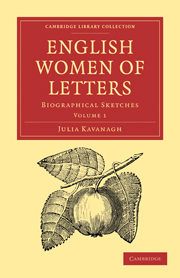Summary
There is a long gap between Aphra Behn and her successors in English fiction. She was held as a feminine prodigy during the days of the Restoration, and such another even the fertile reign of Queen Anne could not yield. English novels were still doubtful and uncertain productions. They had assumed no definite form—Aphra Behn's tales have none—and though the finely drawn character of Sir Roger de Coverley in the “Spectator” was in itself a revelation, authors and public were very slow to understand it. Swift and De Foe produced wonderful books, but assuredly not novels. “Robinson Crusoe” and “Gulliver's Travels” are unique; but they could found no family, they could not become the parents of a tribe. Sir Roger de Coverley, on the contrary, is eminently suggestive. His whims, his gentleness, his unimportance as an individual, contrasting with the minuteness with which he is drawn, the affectionate interest he excites, although there is little or none of a story connected with him, are all significant marks of the English novel. We may look in cotemporary French and English literature and find nothing like him. It took man generations to paint man as he is. The attempt at anything like fine individual painting is scarcely fifty years old in France. Up to that time the men and women of French novels have only a sort of social conventional truth.
- Type
- Chapter
- Information
- English Women of LettersBiographical Sketches, pp. 49 - 78Publisher: Cambridge University PressPrint publication year: 2010First published in: 1863



